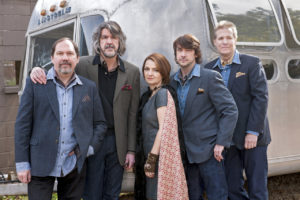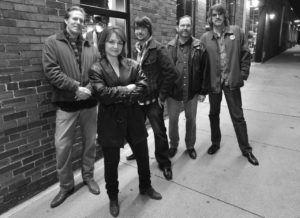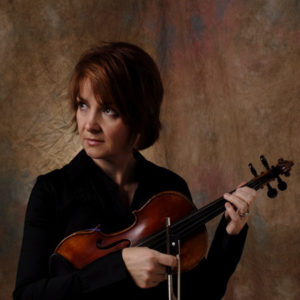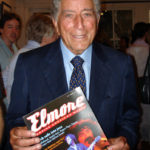Elmore Magazine writer Juila Egan spent a little time with the SteelDrivers’ Tammy Rogers. In addition to playing fiddle for the Grammy-winning band, Rogers has penned and sung harmony on many of the SteelDrivers’ signature tunes. She teaches at the University level and has steady work as a studio musician, so we were lucky to catch up with this busy gal prior to the SteelDrivers’ show in New York on February 10 at Pace University‘s Schimmel Center.
Elmore Magazine: You’re from Tennessee originally?
Tammy Rogers: I am, yes, originally from the eastern part of the state, but my dad moved a little branch of the family out to the Dallas/Fort Worth area when I was about five, so that’s really where I started playing music. I was out there until I was 20 and then I moved back to Nashville so, kind of that Tennessee/Texas connection. That’s fairly common—a lot of music people seem to go back and forth between those two states.
EM: When did you start playing fiddle?
TR: I was 10, and this is one good thing about growing up in Texas at that time. The town we lived in, Irving, had strings in the schools, and I hope they still do. I got to start playing the violin in the 5th grade in school, and then once I got to junior high, I had orchestra every day. I found a great fiddle teacher there, a guy named Johnny who, a few years later, taught Martie from the Dixie Chicks. My dad was a self-taught bluegrass musician, so after I had been playing just three or four months he started teaching me. He wasn’t really a fiddler but he knew enough to show me a couple tunes, and I picked them up very quickly.
I did wind up going to Southern Methodist University in Dallas for two years and finished up at Belmont University, in Nashville, with a degree in classical violin. So I definitely studied that for many, many years, but decided pretty quickly after getting out of college that the fiddle world—bluegrass and country—was kind of more my bag, so that was kind of the end of my classical training after college.
I teach now about one day a week at Belmont, and I try to encourage all my students: “Take as many classical lessons here as you can, just be the best player overall that you can be ‘cause you never know exactly what you’re gonna get called upon to play.”’ That’s kinda just always been my philosophy: just be the best you can be.
EM: You guys have a bit of a tour season coming up?
TR: We do. We had a really busy 2016 after the Grammy win, our schedule just kinda went nuts through the fall. We’re trying to be a bit more judicious about it this year, but we’re really looking forward to coming up to New York City. We always enjoy that.

EM: What are you featuring at your shows?
TR: We have thousands of all original material, so we do songs from every single record. There are certain songs from the first record that are kinda classics now. We kinda have to do them — “If It Hadn’t Been For Love” that’s a big song on tour. And then there’s a couple things from the second album that we now most always do: “Ghosts of Mississippi,” “Rainbows,” some of that kinda stuff. Certainly we’ve tried to feature a good handful of the stuff off the Muscle Shoals Recordings since that’s the last one, and it won a Grammy. Folks will hear a pretty good cross-section of tunes from all four records.
EM: Does not having a drummer ever present any challenges when you guys are writing?
TR: Not really, because I think between the five of us, the challenge is always to create the groove between the instruments that we have. I think that’s what makes the band unique and makes the band sound unique. I mean it’s almost like if we finally went, “Oh let’s just add drums” it would almost be like copping out. I mean no offense to all the great drummers out there, because I still do commercial sessions for other people where there is a drummer, and that’s great and that’s fun to play, but at the same time it kind of puts the monkey on our back to figure out how to do that. So that’s kind of part of our creative process.
EM: Have the song narratives changed from the early albums?
TR: We still talk about a lot of things. There are songs about people drinking and making moonshine, stories from Appalachia if you will, about people having hard times and just the way they deal with it, the heartbreak. I think that’s the gift of writing outside the “commercial realm.” You can write songs about other things besides just love and being happy.
We were just getting together last night to work on some new material, and I had a song that I had co-written with a couple friends of mine, and it’s about the famous picture from 9/11 that they call “The Falling Man.” We have this gift, if you will, to be able to write songs outside of a very small parameter. I had another song that I had written with some other friends that was kind of told from the bartender’s perspective. We’re always looking for those types of songs that maybe tell a little bit different story or from a little bit of a different perspective. And it’s great to not feel like, “Oh, we can’t say that in a song.” Well, yes we can. Why not?
We know we’re not gonna get played on commercial country radio, so we don’t have to worry about what somebody thinks is appropriate or not. If we wanna write it we can write it, and we can sing it! Creatively, you can’t get any better than that. I mean, how freeing! That’s why we have three Civil War songs right now in our repertoire from three different records: the first record “Sticks That Made Thunder” is about a Civil War battle, and from the second record “Can You Run” is from the slave’s perspective of trying to get away, then on the new record, the song, I co-wrote with a couple friends, called “River Runs Red.” I’m so proud of that song. It’s about the battle here in Middleton, Tennessee and I think it had the highest casualty of any Civil War battle. It’s definitely it’s not a pro-war song at all—it’s saying they’re really brothers and they were killing each other. Definitely it’s amazing to be able to write songs like that and get them out into the world.
EM: So you guys are writing a new record right now?
TR: We are actively working on the new record. We’re gonna record in Nashville this time. We’re working with a new engineer/producer David Ferguson. We’re really excited about working with him. He’s up for a couple Grammys this year because he just did the new Sturgill Simpson record.

We just got together last night for our first pre-production rehearsal, going through some songs. When you write something you never really know until you sit down with people and figure how it’s going to work. We worked out three or four different things and we have recording dates! So when we get up to the City next month we will have already been in the studio for a couple days, and not thinking that we’re gonna go in and knock it all out in two days. We like to record and then maybe come back a month or two later and do another separate batch of sessions—that’s kind of historically how we’ve worked.
EM: Were you nervous about Hammer Down after Chris [Stapleton] and Mike [Henderson] left?
TR: Yeah, I mean every record I’m nervous about—to be honest—because every album sets the stakes higher and higher, and each one almost gets harder to try and make it have its own unique slant or spin. To me that’s the biggest reason I didn’t want to go back down to Muscle Shoals for the new record because I didn’t want it to be viewed as a Volume Two. I didn’t want it to be like “Oh well they won a Grammy on that, so they’re just gonna go down there and repeat the same thing.” I’m not interested in repeating.
EM: Right. Congratulations on the Grammy!
TR: It was surreal. I truly did not expect that to happen. Ralph Stanley was in our category and at this point he’s since passed but he was a living legend. Just from the name recognition alone I figured he would win but I think it was better to just not at all expect it, so for it to actually happen was just incredible.
I think the songs were really strong, and I think also Gary [Nichol’s] performance—you know his vocal was just over the top good. You know when you hear “Long Way Down,” and he hits that vocal riff at the end, to me that set the tone for the whole project. Because that was one of the earlier songs that we cut and I was like “Oh my goodness he just went for it, he just put it all out on the line.”
EM: Where do you see the band moving in the next couple of years?
TR: Creatively, I see pushing ourselves to create some different grooves that you might not expect from those five instruments, and maybe branch out a little bit more in some of our arrangements—I don’t wanna say like a jam band—but maybe exploring, giving some people room to stretch out instrumentally, would be a good way to describe it. We’ll keep experimenting within the live setting, but I think we’re going to continue to tour, build our audience, our fan base in that way.
For tickets to Performances at The Schimmel Center, click here
For the SteelDrivers’ tour schedule, click here








Be the first to comment!